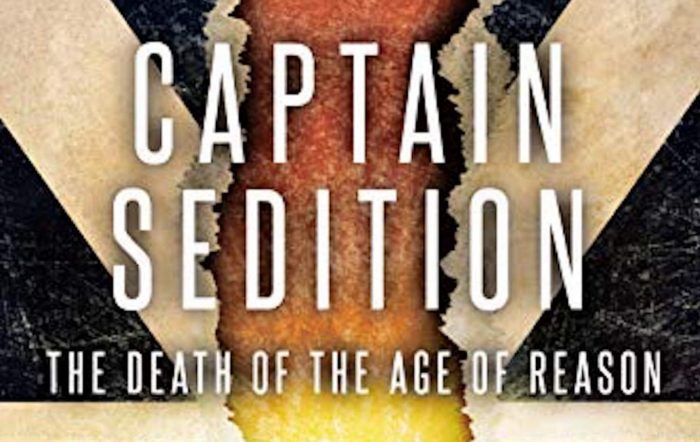Reviewed by Jeffrey Sanzel

K.C. Fusaro offers a compelling work of historical fiction with Captain Sedition: The Death of the Age of Reason. It opens in England, 1774. Joethan Wolfe barely survives a duel due to the duplicity of the woman who caused it. While he recovers, the narrative reveals Wolfe as an American ex-pat, working as a courier throughout Europe. Fourteen years earlier, his father had exiled him to England, resulting in their complete estrangement. Wolfe is a for-hire, with no particular scruples, a lothario, a charmer, and a bit of a profligate. Now, he lives in a house with none other than Benjamin Franklin — referred to with sly affection as “The Doctor.”
Fusaro establishes his approach in the portrait of Franklin, one of the most famous and beloved Americans. He removes Franklin’s halo: “Benjamin Franklin was concurrently the most selfish and the most generous man Wolfe had ever known.” Franklin is miserly with lighting candles due to his difficult upbringing and a candlemaker father. Franklin is calculating, with a fondness for living that is contagious, but he is also Machiavellian. He is present only in the earliest chapters but the portrait establishes Fusaro’s adeptness with even minor characters’ backgrounds and motivations, heralding the rich, engaging tapestry that follows.
When Wolfe learns of his father’s arrest, he spends his last eight year’s earnings acquiring a royal pardon. He sets off on a harrowing trip from Portsmouth to Nova Scotia to the colonies. He intends to deliver various missives to the Tory government in the states. Included is an important document to be placed directly into Governor-General Thomas Gage’s hands, the highest-ranking British official in North America. But Wolfe’s real motive is to seek out and aid his parent.
Wolfe is an interesting case. As an American abroad, he has found his sympathies lie with the British. But he is truly a man without a country. His ambivalence is unusual in this genre, which usually leans towards the rebels. His objectivity makes him a reliable and intriguing narrator; each interaction embroils him in a country amid monumental and violent change.
The adventure takes Wolfe from Canada to Boston and then onto Connecticut and Long Island. As he searches for his father, he encounters the best and the worst of both sides. Wolfe’s goal is to stay neutral. However, by saving a man on the road, he lands in the two-sided conflict. While Wolfe makes choices based on his better instincts, the result is that every action becomes political.
One of the most powerful takeaways is the reminder that the Revolutionary War was the first Civil War. Though perceived as the British versus the Americans, the truth is that it encompassed neighbor against neighbor, citizen against citizen. Many had fought side-by-side with the Redcoats against the French. But in 1775, these allegiances are history. This constant state of unrest manifests in both ferocious loyalty and questionable actions.
The British Government doesn’t respect the Americans: “‘They conceive to govern these colonies from across the ocean with no say from we who actually live here. They could not show us more contempt did they spit on us.” Wolfe accepts the reality that “in his experience, all Englishmen viewed Americans as lesser creatures and the British aristocracy’s disdain for Americans was the worst. By their lights, disturbances in far-flung colonies were to be expected and dealt with, quickly and decisively. The better sort of Britons had no more tolerance for rebellious slaves in the Indies.”
Also revealed is the eagerness to fight. “‘You can’t wait for the fighting to start, can you?’ Wolfe said. Tim did him the honor of not pretending otherwise. He backed his ardor with a concise argument based on the English Constitution and especially the Massachusetts Colony Charter, but in the end, Tim wanted to fight.” The world of 1775 is dangerous and roiling, a powder keg in every sense.
The shadow of slavery pervades. Wolfe regards the ability to own slaves and yet fight for one’s own freedom as a gross stroke of hypocrisy. Says one militia commander, “‘… the people are entitled to life, liberty, and the means of sustenance by the Grace of God and without leave of the King.’ In Wolfe’s estimation, the appearance of a slave immediately after rendered the words hollow.”
The book is peopled with an extraordinary cast of characters, expertly blending the historical with the fictional: All seem real, fallible, and wholly dimensional, enforcing Fusaro’s premise that no side is completely right or wrong. Wolfe plays Devil’s Advocate with “‘… how long can Government suppress a population on the other side of the ocean against its will?’” followed by “‘We live in an age of reason. To not consider both sides would be unreasonable.’”
Fusaro’s research is extraordinary. His knowledge of everything from clothing to customs, from mercantile to mercenaries, is exceptional. Whether describing a ragamuffin tailing Wolfe, a difficult voyage, or a simple meal, he paints vivid and detailed pictures. He breathes life into the story with details that elevate the narrative. He has also found a syntax in language that honors the period but avoids sounding stilted or contrived. He also calls attention to the complicated religious landscape and the intolerance it bred within the communities.
The book’s climax is April 19, 1775: The Battle of Lexington and Concord. He unflinchingly describes the carnage —“the raw savagery.” It is in this clash that Wolfe must choose sides —“to declare.” It is a hard lesson for Wolfe, but he has reached the point of no return. He is torn but accepts the reality.
It is a powerful ending to the first volume of a proposed three-book series. One year from the beginning of Wolfe’s journey, he has returned to his place of birth, witnessed and experienced the change in his homeland, and accepted his fate. We, like Wolfe, will await what comes next.
————————————————-
Author K.C. Fusaro grew up in Setauket, and after many years away, recently returned to take up residence in Rocky Point. Best known for plying the rock and roll trade with the band Body Politics, along the way to writing fiction there were excursions into film, theater and television, both in front of the camera and behind the scenes.
Pick up a copy of Captain Sedition at Book Revue in Huntington, barnesandnoble.com or amazon.com.





